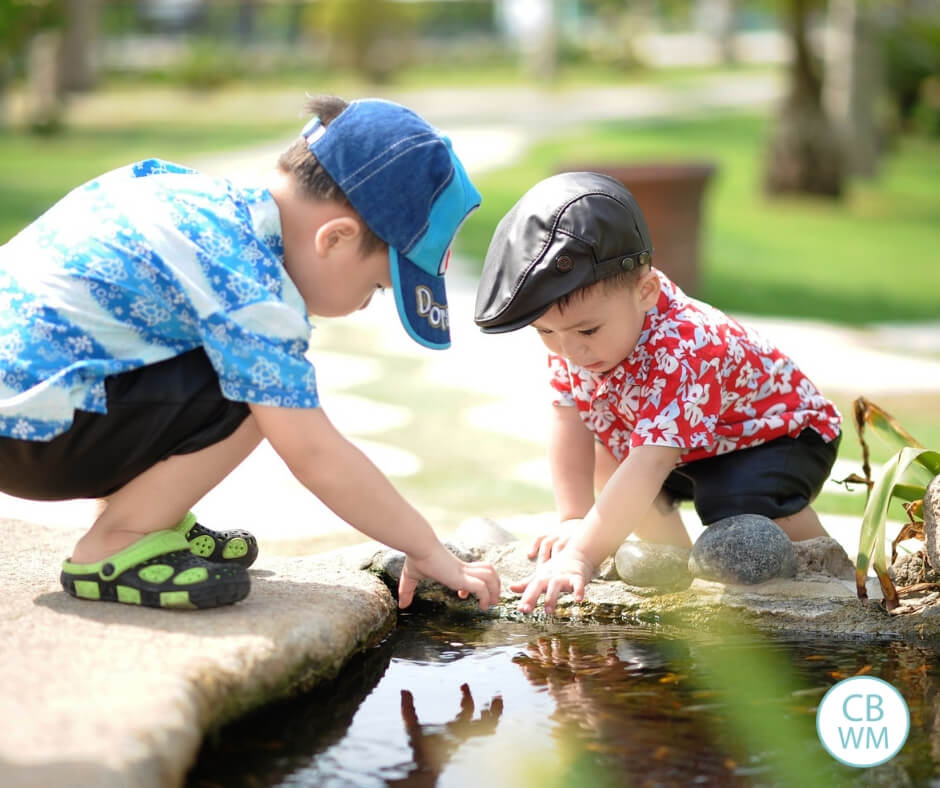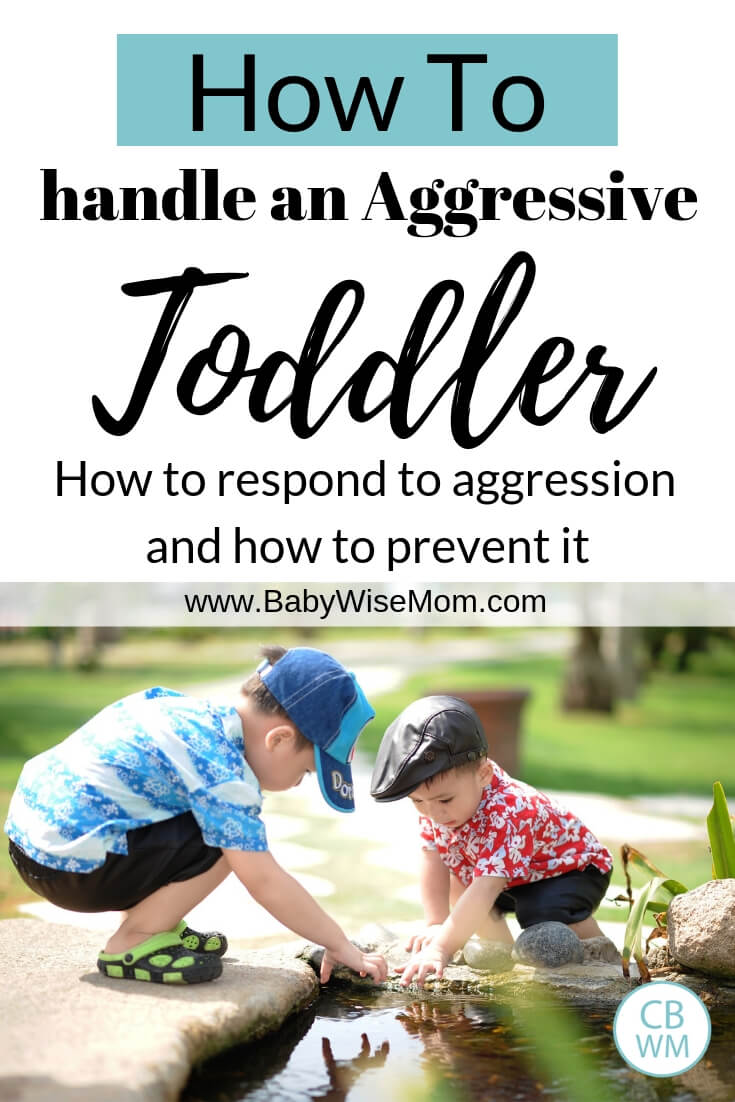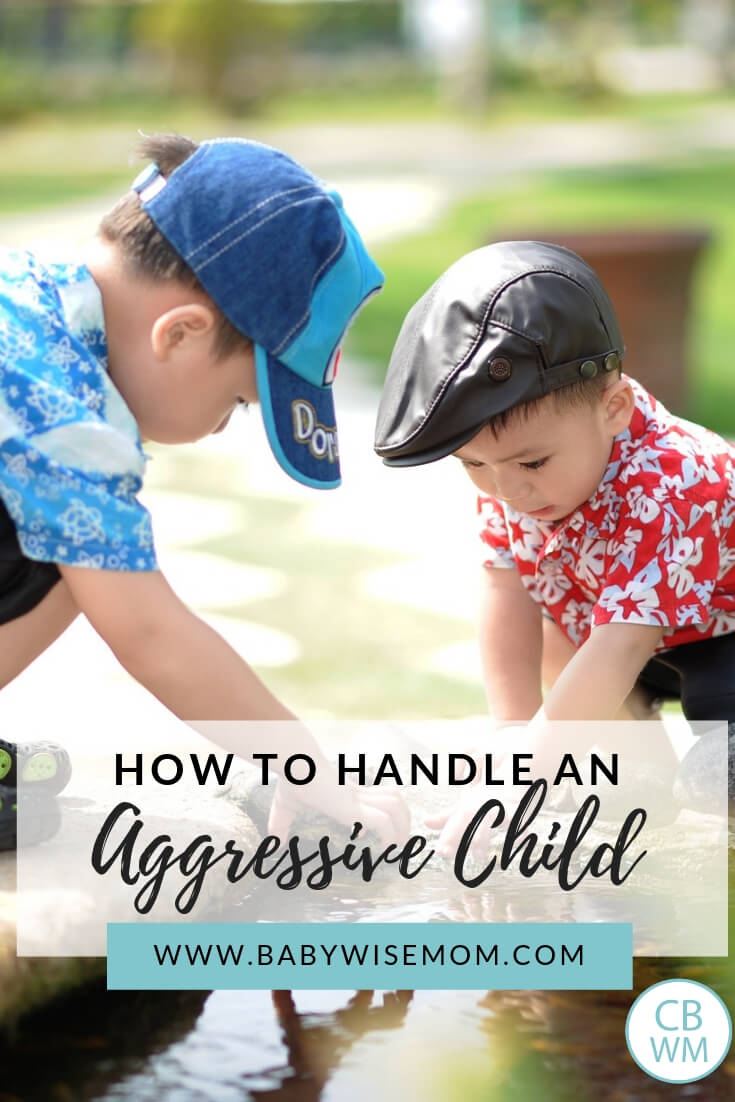How to respond when your toddler or preschooler is hitting or hurting other children. Appropriate consequences as well as how to prevent aggression in the future.

How do you handle an aggressive toddler or preschooler? No one wants their child to be mean to others. No one wants to have the child who is constantly hitting, biting, or throwing stuff at other children at the park. Let’s be real, we don’t want our child to do it ever, let alone constantly. There are things you can do to teach your child to not hit and to prevent it from happening in the future.
If you have a child who is a hitter right now, do not despair. Many children go through a little phase of hitting. It always surprises me to read old posts about my second child, Kaitlyn. She was a hitter when she was younger. She would only hit her older brother.
I don’t remember that about her. She is my peacemaker!
My fourth child was a hitter at certain times. She would hit other children if she was playing with them during her nap time. If it wasn’t nap time, we had no problems. During nap time, she typically would hit someone.
Both of them were hitters for a short-lived period. We used the tips outlined in this post to help them stop hitting. You can get there, too! You can also reach that point of shock 5 years to look back and remember your child was once a hitter.
Having a toddler who hits doesn’t mean you have a child who will always be mean or aggressive. It is the way she has chosen to respond to challenges in life. You can teach her a different and better way.
Let’s discuss what to do when your child hits.
Post Contents
Remove Toddler Immediately
When a child is being aggressive toward others, it is wise to remove the child from the situation immediately. If you are home and one child isn’t playing nicely with another, the aggressive child needs a break.
The first time, you might try a time out approach. If the child comes out of time out and is aggressive, then go to the child playing alone until the next major transition. “I am sorry you are choosing to hit today. You will play by yourself until nap time. After nap, you can try playing with others again.”
If your child is a repeat offender, don’t mess around with a timeout first. Just go straight to the isolation. Your goal is to stop the aggressive behavior. Will your child be sad to not get to play with her sister for the rest of the morning? Yes indeed. Hopefully, it will be sad enough that she won’t hit her sister tomorrow when she gets mad.
I have observed some moms over the who just tell their child to not hit, maybe require an apology, and do nothing beyond that. Those children are typically hitting again in less than 5 minutes. If you don’t want the aggression to continue, you have to make it known to your child that it isn’t okay. There needs to be a consequence for your child that he or she wouldn’t want repeated.
Read: Logical Consequences for Public Tantrums
Leave the Situation/Activity
If you are out and about, it can be harder to remove the child to isolation. You might be at the park and one of your children is hitting other children, but your other children are behaving nicely. You don’t want to punish the other children because of one, do you? No one wants to.
Start by instructing the offending child to sit in a certain spot by you. Since the child can’t play nicely, the child doesn’t get to play. If the child won’t cooperate with that (and don’t be surprised if she won’t), then it is time to pack up and leave no matter how unfair it is to the others.
Your other children will not be happy, and that will help your aggressive child think twice next time. Your child will know she unfairly led to a punishment of siblings and will avoid re-creating the situation.
No one wants to leave a fun event early–not even mom. This can be a hard thing to enforce. Do it! Your child will understand you take hitting seriously and that it won’t be tolerated. Empty threats will not teach; actions will.
If it becomes a constant problem and/or the aggressive child doesn’t mind making it so her siblings have to leave, then plan times to take out non-aggressive children and leave the aggressive one home with one parent or a babysitter. For more information on consequences for hitting and biting, see this post.

Remove Mis-Used Items
If your child is being aggressive with items, like throwing toys, remove the toy from your child. Do not say, “I am going to take this away for five minutes and then give it back to you. Don’t hit with it again.” Take it away for the day or for a week or two. That will be more meaningful than five minutes.
You want your child to not want to hit with a toy again. You have to make the consequence big enough that your child will think twice next time. Taking a toy away is very painless in the grand scheme of life. Read more about responding to mis-used items here.
Focus on Prevention
You don’t want to only react to situations, you want to prevent them. Consequences can deter, but they usually won’t solve. You need to teach your child in her heart to not be so upset she reacts by trying to physically harm others. You need to teach her to control her actions.
Make sure your child understands that you understand that strong emotions are at play here. You know your child is hitting because she is frustrated. Or she is mad. Or she is tired of being pushed around. Or someone stole her toy. Make sure she knows you get why she is doing it.
Then you need to explain that even when we are mad, it isn’t okay to hurt others. Your child will be mad or frustrated often in life. She has to learn to deal with it in a non-aggressive manner. Give her ideas of what she can do instead of hitting, biting, or throwing. There are options; help her know what they are.
Teach your child to have self-control. It is okay to feel, but we don’t get to act any way we feel like acting. For ideas on how to do that, see this post.
In your prevention efforts, employ the ask and tell method. When you are about to go out, have a friend over, or your children are about to play, remind them what is acceptable and what isn’t. Remind your child who can be aggressive that it isn’t okay to hit/bite/throw toys. Remind her of the consequence that will follow if she chooses to do something she shouldn’t. Remind her what she should do instead if she gets mad. Make sure she understands. Then follow through if necessary.
Recognize Triggers and Avoid Them
Until your child matures and learns to control herself better, recognize what situations your child acts out in and avoid those situations. If your child is never a hitter unless she is at the park during nap time, don’t go to the park during nap time.
Like I said earlier, Brinley would hit other children if we were out during her nap time. I stopped being out when it was her nap time. I made sure we were home for her nap.
Children are more likely to be aggressive toward others if the child is tired, hungry, overstimulated, can’t communicate, or is around another aggressive child. Make sure your child is well rested and has a full belly before playing with others. Make sure your child’s playtime lengths aren’t too long for her to handle. You can also teach sign language to help your child express certain common things.
Read: How to Prepare Your Child for Great Behavior in Public
Conclusion
A child who is aggressive, whether frequently or infrequently, won’t usually stop the aggression overnight. You won’t have one consequence that will stop it for good or one amazing talk that changes your child’s heart forever. I don’t say that to discourage you, but rather to encourage you to be consistent and keep working. It won’t happen overnight, but it will happen if you stick to it.

Related Posts:
- 10 TRUTHS ABOUT PARENTING A TODDLER
- 7 TRUTHS ABOUT PARENTING PRESCHOOLERS
- HOW TO DEAL WITH TODDLER TANTRUMS
